Ahead of Tuesday court date, a summary of charges against Speaker Mike Hubbard
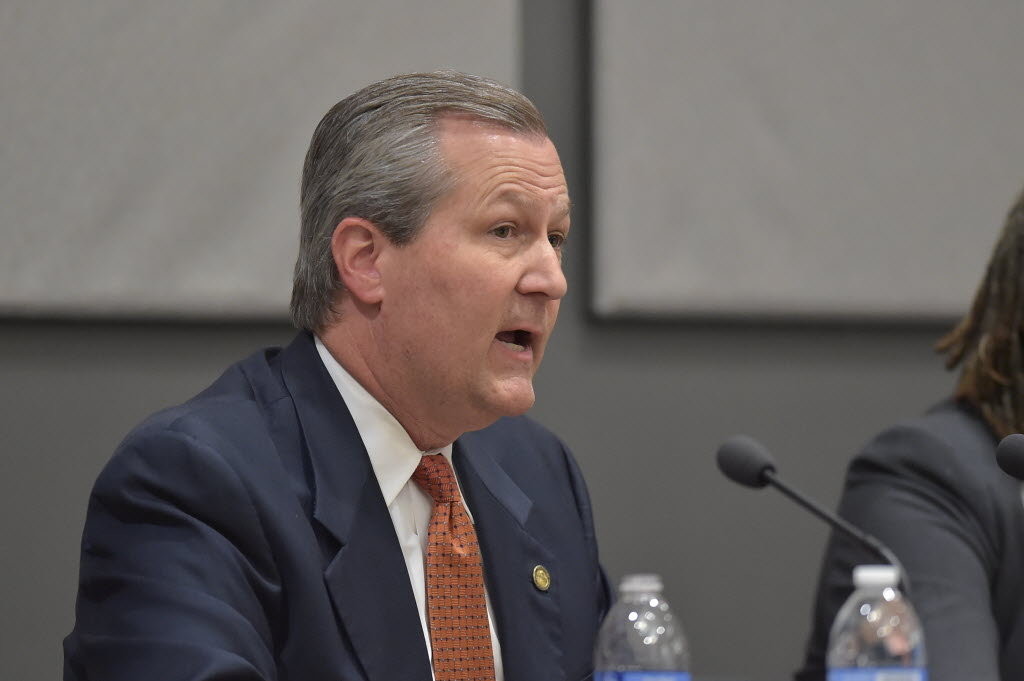
Alabama House Speaker Mike Hubbard goes on trial Tuesday. He is accused of using his political positions to make money and obtain financial favors from lobbyists and companies with business before the Alabama Legislature. Hubbard says he is innocent. Among the charges: — Hubbard is accused of using his past position as chairman of the Alabama Republican Party to steer $1 million in party funds to his media companies, Craftmaster printing company and the Auburn Network. The largest sum, according to prosecutors, was $697,479 in printing work that a Florida company subcontracted back to Craftmaster during the 2010 campaign. — The American Pharmacy Cooperative Inc. hired Hubbard in a $5,000-a-month consulting contract. He is accused of voting for legislation that could have benefited the company even though he had a conflict of interest. Budget language that prosecutors said Hubbard endorsed set requirements for any pharmacy benefit manager that Medicaid might hire. The only company that met the requirements was the Cooperative, Medicaid officials have said. — Hubbard is accused of improperly soliciting or receiving a thing of value from Southeast Alabama Gas. The company hired Hubbard in a $12,000-a-month consulting contract. Hubbard is also accused of being improperly paid to represent Southeast Alabama Gas before the Alabama Department of Commerce and Gov. Robert Bentley. — Hubbard is accused of soliciting political consultant Dax Swatek, Business Council of Alabama board member Will Brooke, a Sterne Agee investment company lobbyist, Great Southern Wood President Jimmy Rane and Hoar Construction company for an investment in his business, Craftmaster Printers. Republished with permission of The Associated Press.
Jury being selected in Mike Hubbard corruption case
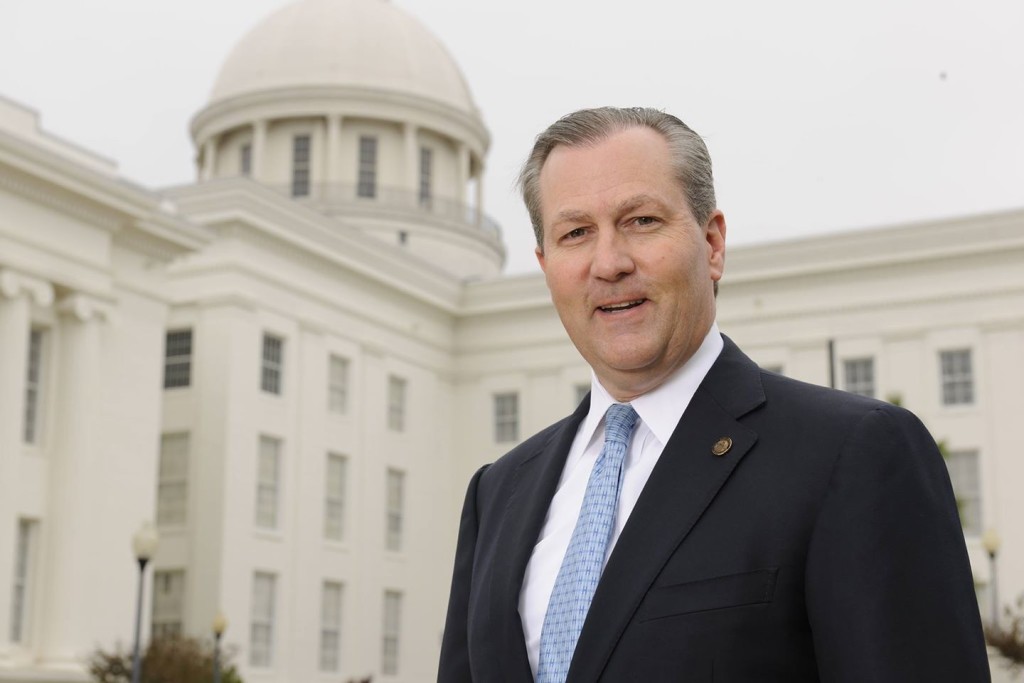
Jury selection began Monday in the corruption trial of Alabama House Speaker Mike Hubbard, who is charged with violating the tough state ethics law passed by the Republican-controlled Legislature he helped bring to power nearly six years ago. Hubbard is accused of using his office as House speaker and past position as Alabama Republican Party chairman to benefit his clients and businesses — 23 felony ethics charges in all, each punishable by up to 20 years in prison. He has maintained his innocence and said his transactions were legal. During legislative sessions, Hubbard, 54, presides with gavel in hand over the Alabama House of Representatives as one of the most powerful politicians in the Deep South state. On Monday, he sat flanked by defense lawyers in a wood-paneled courtroom, looking over at the potential jurors who could decide whether he continues in power or goes to prison. Attorneys began questioning nearly 100 prospective jurors on Monday ahead of opening statements next week. Most said they had read or seen news stories about the case, which has dominated headlines in Alabama since Hubbard’s indictment in 2014. Two potential jurors raised their hands when asked if they already had a fixed opinion about his guilt or innocence. Lee County Circuit Judge Jacob Walker read off the list of potential witnesses that includes some of the most prominent names in state politics and business. Alabama Gov. Robert Bentley, former Gov. Bob Riley and many Alabama lawmakers are expected to be called by the prosecution to testify. Bentley himself is weathering a scandal, facing calls for his impeachment after the exposure of his relationship with a former aide. Meanwhile, Chief Justice Roy Moore has been suspended over accusations that he violated judicial ethics by trying to block same-sex weddings, despite the U.S. Supreme Court decision effectively legalizing gay marriage. Hubbard, first elected to the House in 1998, lashed out at what he called a culture of corruption in state government as he led the Republican takeover in 2010, ending 136 years of Democratic control of the Alabama legislature. One of their first actions with Hubbard as speaker was to pass the tough new ethics law. Hubbard is accused of steering GOP campaign printing work to one of his companies; asking lobbyists and corporate leaders for employment, investments or help finding clients; lobbying the governor’s office on behalf of one of his clients; and taking legislative action that could have steered Medicaid pharmacy business to a client of one of his companies. Prosecutors have painted Hubbard as a politician consumed by greed as he ascended to the top of the state’s political hierarchy. They are expected to introduce emails he sent that make him seem desperate for more work and investments. His defense has suggested that prosecutors are stretching the bounds of the ethics law and trying to criminalize Hubbard’s efforts to make a living. Defense lawyer David McKnight described Hubbard as a salesman and entrepreneur who also happens to be a politician. He asked potential jurors if they ever sent an email they wouldn’t want read aloud in front of strangers, or if they would be offended by emails with “pushy” salesman language. “Admittedly you are going to see some emails where he’s trying to get more business, trying to get more clients, trying to get more customers,” McKnight said. Hubbard has said little about the corruption case in public since a judge issued a gag order. “I’m confident when the truth comes out that I will be exonerated and my name cleared.” Hubbard told The Associated Press in January. Republished with permission of The Associated Press.
Jury selection set for Alabama House Speaker Mike Hubbard
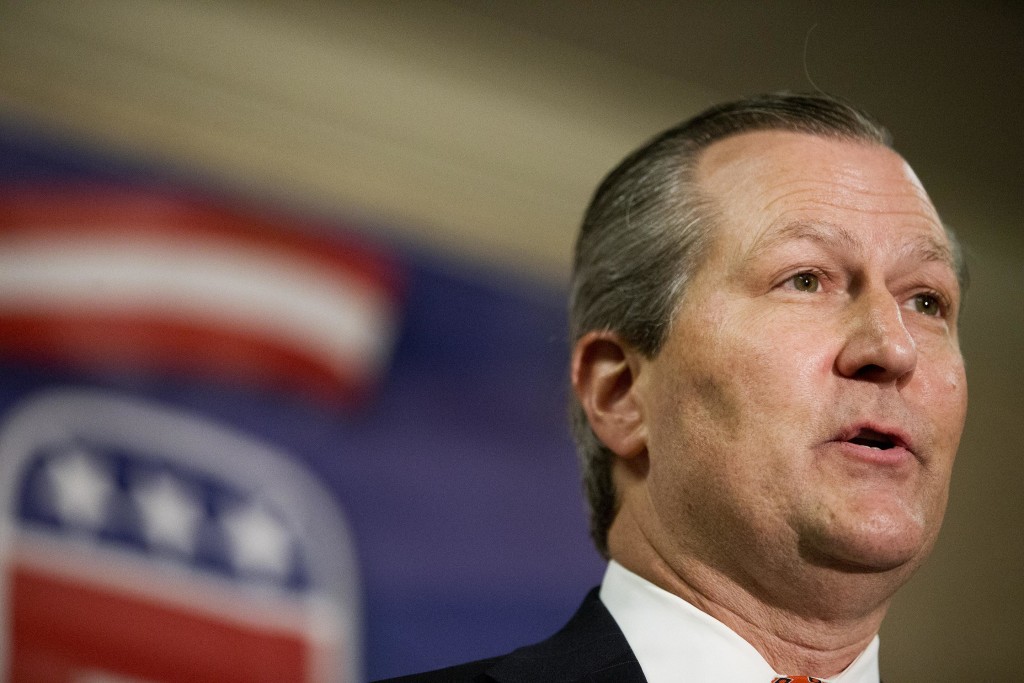
The speaker of the Alabama House is going on trial on felony ethics charges that could result in his removal from office. Jury selection is set to begin Monday for state Rep. Mike Hubbard of Auburn. He’s facing 23 counts of using his office and past position as chairman of the Alabama GOP for personal gain. Hubbard says he didn’t do anything illegal. A jury pulled from as many as 140 prospective jurors will decide his fate in a trial that officials say could last three weeks. Hubbard’s trial comes as two other top Alabama officials are also at risk of losing their jobs. Gov. Robert Bentley faces an impeachment move amid a sex-tinged scandal. Chief Justice Roy Moore is suspended after being accused of violating judicial ethics. Republished with permission of The Associated Press.
Chief Justice’s suspension adds to Alabama’s political mess
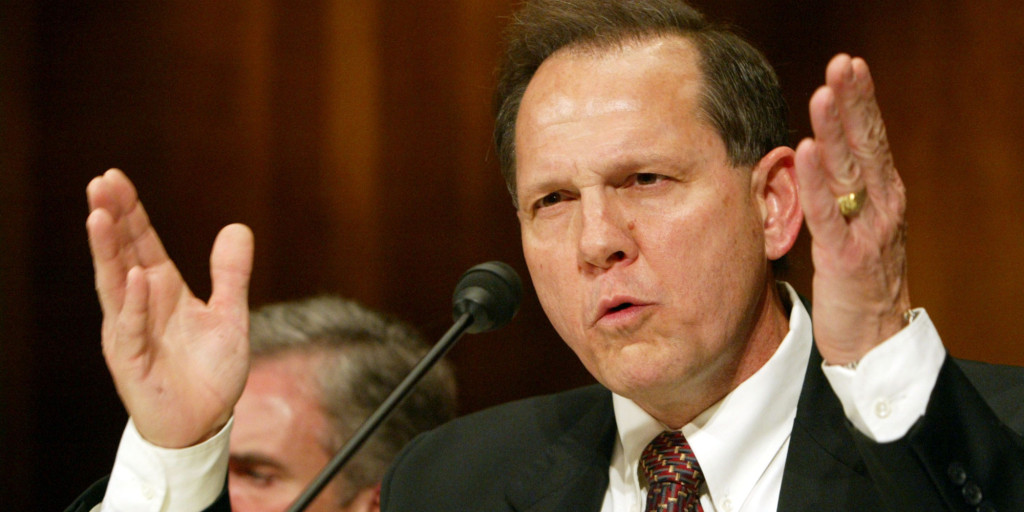
Alabama politics are at a low point even by Alabama standards: In a state that trails the nation in many areas, three top elected officials are embroiled in scandal or facing removal from office while a former governor serves time in federal prison on a corruption conviction. Chief Justice Roy Moore was suspended from his job Friday and faces possible ouster over his attempts to block gay marriage following the U.S. Supreme Court ruling that effectively legalized same-sex marriage nationwide. It’s familiar territory for the Republican Moore, a Christian conservative who was previously removed from the same position in 2003 over a Ten Commandments monument and easily won re-election later. Meanwhile, fellow Republicans tried to remove Gov. Robert Bentley by impeachment in the just-ended legislative session over a sexually charged scandal involving a top political aide, and an investigation continues. At the same time, GOP House Speaker Mike Hubbard awaits a state trial on 23 felony ethics charges that could result in his removal. If convicted, Hubbard could even join the ranks of the imprisoned like former Gov. Don Siegelman, a Democrat who was convicted on federal influence-peddling charges. All in all, it’s some of the worst of times for Republicans who promised to clean up state government after seizing control from Democrats who dominated for generations. “I never recall when the top leaders of all three branches of government were simultaneously accused of improper behavior,” Bill Stewart, a retired political scientist from the University of Alabama, said Saturday. It’s hard for state government to concentrate on issues like Medicaid or improving a dilapidated prison system when so many officials are fighting for their jobs, he said. “It’s definitely a traumatic time,” Stewart said. Among the nation’s poorest states, Alabama is troubled by problem areas including physical and mental health; comparatively low high school graduation rates; and too many occupational deaths, according to a report by the United Health Foundation. It consistently ranks high in college football – the University of Alabama is the reigning national champion – while struggling in so many other ways. Yet the ranking leaders elected to sort out the mess face confounding troubles of their own. In its list of civil charges against Moore, the Alabama Judicial Inquiry Commission said the 69-year-old chief justice abused his office by issuing an administrative order to probate judges in January telling them an Alabama court order and law banning same-sex marriages remained in effect despite the U.S. Supreme Court decision affirming same-sex marriage six months earlier. Most counties issued same-sex licenses anyway. In a statement after his suspension, Moore said the commission doesn’t have the authority to police the order he issued. As during a news conference last week, Moore criticized the Judicial Inquiry Commission by referring to a recent protest outside his office that included gay and transgender people. “The JIC has chosen to listen to people like … a professed transvestite, and other gay, lesbian and bisexual individuals, as well as organizations which support their agenda,” Moore said. “We intend to fight this agenda vigorously and expect to prevail.” The Court of the Judiciary will decide whether Moore violated judicial ethics, and he could be removed from office if found guilty. The same court removed Moore from office in 2003 for his refusal to follow a federal court order directing Moore to remove a washing machine-sized Ten Commandments monument from the rotunda of the state’s judicial building. The governor faces very different problems. In March, Bentley admitted to making inappropriate remarks to an aide, Rebekah Caldwell Mason, in a scandal that has included the public airing of secret recordings that captured Bentley professing love to someone and telling her how much he enjoyed kissing her and touching her breasts, and referencing a need to start locking his office door. The admission came seven months after the former first lady, Dianne Bentley, filed for divorce after 50 years of marriage. Bentley has struggled to shake the scandal, and lawmakers obtained enough signatures to file impeachment articles during the legislative session that ended Wednesday. The House Judiciary Committee will review the claims to see if there are grounds to remove Bentley from office. Hubbard, the House speaker, is at risk of losing his job because of criminal charges. Hubbard is scheduled later this month on 23 felony ethics charges accusing him of using his position as speaker, and previous post as chairman of the Alabama GOP, to direct business to his companies, lobby the governor’s office and to solicit investments and clients for his businesses. Bentley could be among the prosecution witnesses. Hubbard, arguably the most powerful person in state government because of his influence and power to control the House agenda, argues the transactions were legal and separate from his public duties. Hubbard will be automatically removed from office if convicted on even one felony count. He would join the ranks of Alabama politicians convicted of ethics violations or corruption that includes two recent governors, Republican Guy Hunt and Siegelman, the Democrat. Hunt, a Primitive Baptist preacher, was convicted and removed from office in 1993 for using campaign and inaugural funds for personal expenses. He tried to mount a political comeback but failed before his death in 2009. Currently imprisoned in Texas, Siegelman was convicted in 2006 on federal charges of selling a seat on a state health regulatory board in exchange for $500,000 in donations to Siegelman’s campaign to establish a state lottery in 1999. A bipartisan group has asked President Barack Obama to pardon Siegelman, claiming his prosecution was unjust and tainted by politics.
Robert Bentley’s prison reform plan scaled back, dies in final minutes of legislative session

Gov. Robert Bentley‘s massive plan to build four new prisons faced an eleventh-hour failure as it died Wednesday, just minutes before the Alabama Legislature’s 2016 session wrapped at midnight. Earlier in the evening, a conference committee reached a compromise and scaled back Bentley’s prison construction plan to include two new men’s prisons, rather than the initial three, and a new women’s prison to replace Julia Tutwiler Prison. It also dropped the maximum amount of the bond issue from $800 million to $550 million. As clock countdown to midnight, the Senate passed the compromise 23-12 as the clock read 10:50 p.m., granting the House 70 minutes to tackle the bill. But the bill was never brought up in the House before time expired Wednesday night. Auburn Republican House Speaker Mike Hubbard, said the legislation did not have the votes to break an inevitable filibuster in the chamber. “I did not want to waste the membership’s time,” Hubbard said from the chair. Bentley had announced the massive prison reform project in his 2016 State of the State address in February and took reporters on tours of overcrowded state prisons. The governor’s press office did not have an immediate response to the bill’s failure.
Judge denies Mike Hubbard’s ethics trial delay request; jury selection begins May 16

Lee County Circuit Judge Jacob Walker denied another request from House Speaker Mike Hubbard‘s legal team to delay his ethics trial. Hubbard’s lawyers had told the judge they needed more time to sort through what they claimed were truckloads of documents to prepare for the trial. Walker said the attorneys should be prepared to go to trial as scheduled, with jury selection beginning the week of May 16 and opening arguments commencing the week after that. Hubbard currently faces 23 felony charges of using his office for personal gain. He has been accused of using his position as Speaker of the House, and formerly as chairman of the Alabama Republican Party, to solicit jobs and investments in businesses with which he was involved. Further, Hubbard is accused of lobbying members of the executive branch for consulting clients and aiding in the inclusion of General Fund language to benefit a client. Hubbard has maintained his innocence and was reelected despite the felony allegations.
Former top cop files suit against Robert Bentley, Rebekah Mason
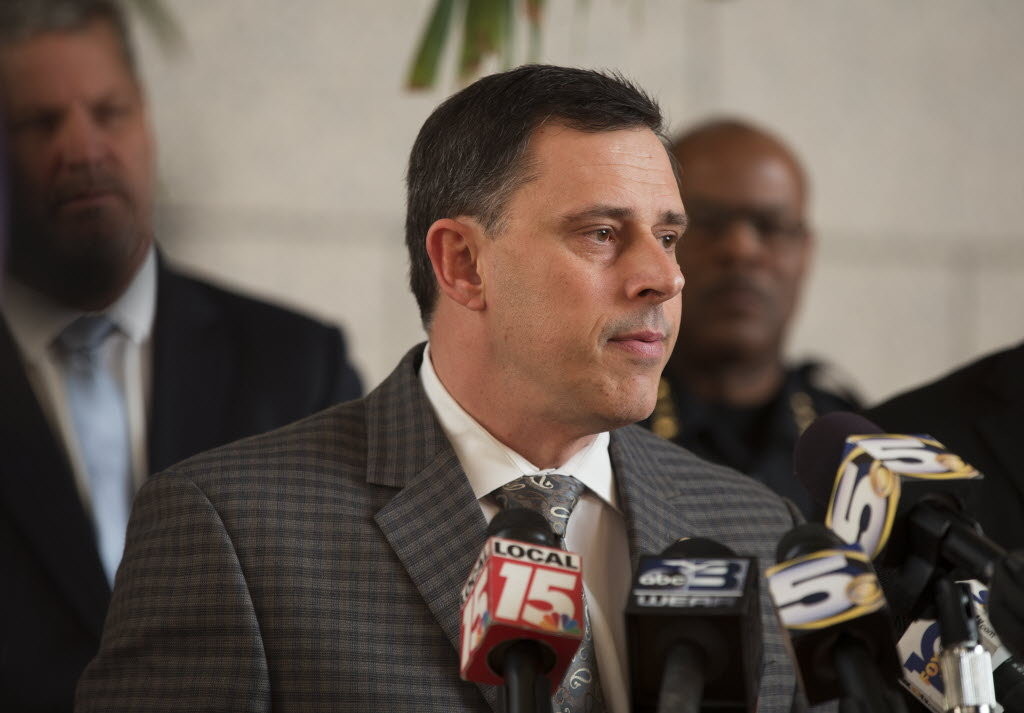
Alabama Gov. Robert Bentley‘s former law enforcement secretary sued his former boss Tuesday, claiming he was wrongly fired. Spencer Collier, who the day after his firing accused Bentley of having an affair with an adviser, says in the lawsuit filed in Montgomery that Bentley and the adviser, Rebekah Mason, made misleading statements to the media to try to discredit him. “Their lies have hurt me financially, have severely damaged my reputation and they have made it their mission to permanently end my career in law enforcement,” Collier said in a statement. Jennifer Ardis, a spokeswoman for Bentley, said the governor’s office had not seen the lawsuit and did not have an immediate comment. Bentley has previously said Collier was fired after an internal review found a misuse of funds at the state law enforcement agency. A text message to Mason and a call to Mason’s attorney were not immediately returned. The lawsuit is the latest twist in a sordid political tale that has engulfed the 73-year-old governor in controversy. It has been punctuated by back-and-forth salvos between Bentley and Collier, who were once close friends when they served together in the Alabama House. Collier’s lawsuit accuses the governor of firing him because the two disagreed over a request to file an affidavit saying investigators found no evidence of misconduct by prosecutors in the ethics case against House Speaker Mike Hubbard. Collier said he wanted to file the affidavit, but the governor didn’t want him to. He says Bentley asked him to lie to prosecutors and that he was unwilling to do that because it would be illegal. The governor is expected to be a prosecution witness at Hubbard’s ethics trial next month. Among the charges Hubbard faces is using his public office to benefit his clients by lobbying the governor’s office. “The governor did not tell anyone including Spencer Collier not to comply with the law – just the opposite. The governor wanted everyone treated correctly and in accordance with the proper law enforcement procedures,” the governor’s spokeswoman has said in a previous statement. A day after being fired, Collier accused Bentley of having an affair with Mason. The governor later admitted making inappropriate remarks to Mason, who has since resigned, but said he did not have a “physical affair.” However, racy recordings have surfaced of Bentley making sexually charged remarks, referencing kissing and touching, to someone with the same first name. The governor’s new law enforcement secretary, Stan Stabler, said last week that it was Collier who sent a state helicopter in 2014 to fly Bentley’s forgotten wallet from his hometown in Tuscaloosa to his beach house at Fort Morgan. Collier said he never approved the flight. Bentley said he did ask state security to retrieve his wallet, but he did not know they were going to use a helicopter to do it. Republished with permission of the Associated Press.
Prosecutors file motions to limit testimony in Mike Hubbard case
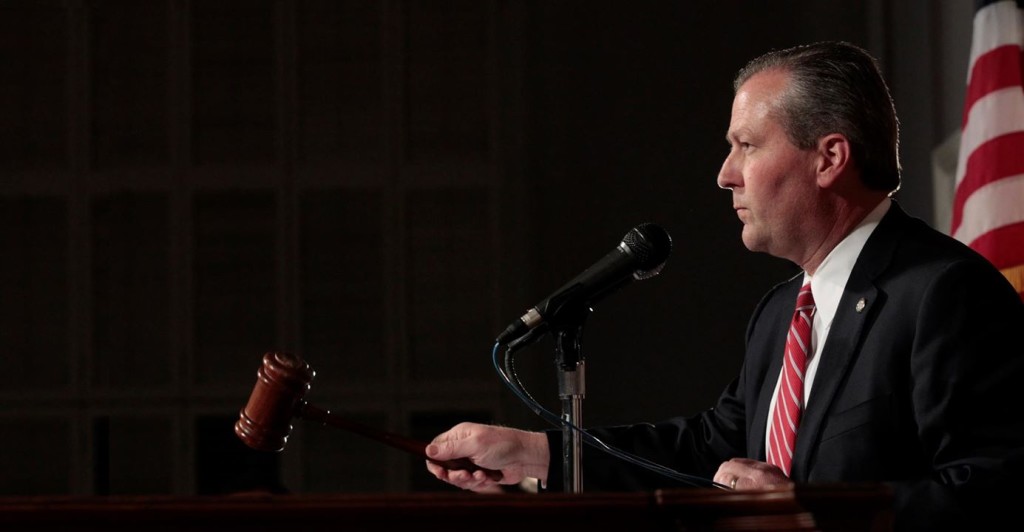
The state is asking a judge to prohibit House Speaker Mike Hubbard‘s defense from raising prosecutorial misconduct claims and other issues at his upcoming ethics trial. The attorney general’s office on Wednesday filed a series of motions seeking to limit arguments and testimony during the trial scheduled for May. Prosecutors asked a judge to prohibit Hubbard from trying to put a prosecutor on the witness stand to try to reopen a prosecutorial misconduct claim. State lawyers also sought to limit discussions of Hubbard’s lopsided 2014 re-election win, how much jail time Hubbard could face and other issues. Prosecutors said that testimony would distract jurors. They argue that jurors should focus on whether Hubbard used his public offices for personal financial gain. The Republican speaker faces 23 felony ethics charges. Republished with permission of the Associated Press.
Comprehensive list of who has asked Robert Bentley to step down
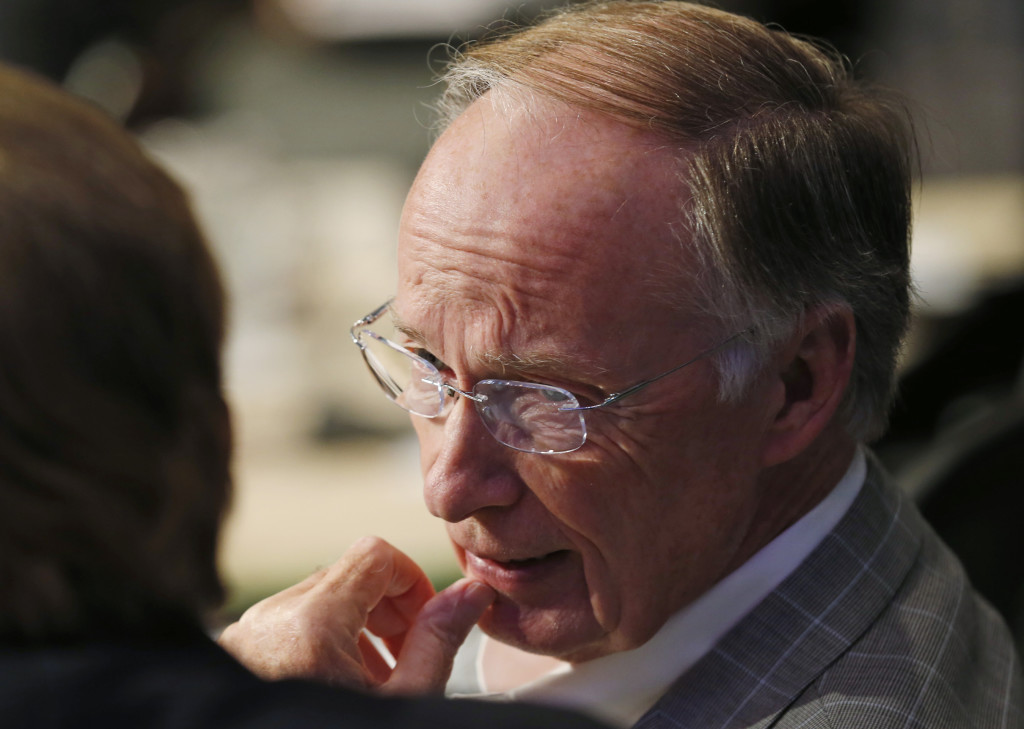
Calls for Alabama Governor Robert Bentley to resign have grown during the past week, as more recordings allegedly between the governor and his former senior adviser Rebekah Caldwell Mason were released. Here is a comprehensive list of the elected officials, state leaders, and groups who have called for the governor’s resignation. Elected officials Rep. Ed Henry, Republican of Hartselle* Rep. Will Ainsworth, Republican of Guntersville** Minority Leader Craig Ford, Democrat of Gadsden Rep. David Standridge, Republican of Hayden Rep. Johnny Mack Morrow, Democrat of Red Bay Sen. Bill Holtzclaw, Republican of Madison Sen. Shay Shelnut, Republican of Trussville Rep. Danny Garrett, Republican of Trussville Groups College Republican Federation of Alabama Montgomery County Republican Party Alabama Republican Assembly Other Prominent Individuals Terry Dunn, former Public Service Commissioner and member of ALGOP Executive Committee Who Has Stayed Silent Alabama Attorney General Luther Strange‘s office released a statement saying they would investigate any wrongdoing, but cited a “longstanding policy regarding pending criminal investigations,” announcing no further information or comment would be released. Republican legislative leadership, including House Speaker Mike Hubbard and Senate President Pro Tem Del Marsh have each been silent on their thoughts about the matter. Likewise, members of the federal delegation have chosen to stay above the fray. Bentley, himself, says he’ll stay in office, calling the scandal “old issues.” “Obviously, there are concerns across the state,” said Bentley. “I’ve got to give the explanation I can give and let them know what we’re going to do and basically tell them how sorry I am. Have I made mistakes? Yes, I have. And I admit those. We’ve addressed those and we properly addressed those several months ago. “These are old issues. It’s just now that people have heard about them. But we’re going to address those and we’re going to move on.” Other Perspectives While reactions to the allegations themselves have been growing, statements made in the aftermath have added another level of commentary to the discussion. Alabama Policy Institute Vice President Katherine Robertson took issue with Mason’s characterization of heightened scrutiny of her relationship with the governor as “gender bias.” “Is there gender bias in Montgomery?” Robertson wrote. “In some cases, but Mrs. Mason cannot claim it. Where true bias exists, people are treated in a certain way (usually negative) due to some preconceived notion about them, whether based on their age, appearance, or ethnicity – not based in reason. “Knowing the evidence that was now available to the public, Mrs. Mason did not deny anything, but in a desperate diversion, tried to claim that her gender was to blame for her present predicament.” Minority Leader Craig Ford added another perspective to the mix in an op-ed for Alabama Political Reporter Thursday, saying the scandal may impact the state’s ability to recruit companies. “His actions are costing Alabama jobs,” Ford said. “There are business owners and leaders of industry who don’t want to sit down with this governor because of the image of corruption that has engulfed the state. We have lost so much opportunity because of this mess. How in the world can we bring anyone else in? What CEO or other corporate group would want to come down here right now? “We are competing against Florida, Georgia, Tennessee and other states that are going to use all of this against us. The governor has provided our competitors with an unfair advantage, and it is absolutely costing us economically.” The timing of the allegations have added another twist to any forced resignation or impeachment attempts. With the legislature on spring break until Tuesday, April 5th, lawmakers have had ample time to whip potential votes on each side of a potential impeachment. Likewise, Speaker Hubbard’s impending trial could throw a wrench into attempts to remove the governor. AL.com writer Kyle Whitmire speculated the Speaker’s legal troubles and the governor’s relationship with Mason are more closely intertwined than it appears on the surface. “The governor, with Mason whispering in his ear and a lawyer with assorted loyalties at his side, took an active and disruptive role in a criminal prosecution of Mike Hubbard,” wrote Whitmire. “That’s the story, not the sex. And no matter the myriad open questions that might take months or years to answer, if ever, one question has a clear answer. Cui bono? Who benefits. Bentley might have blown himself up trying to throw a bomb under Matt Hart‘s chair, but either way, it works for Mike Hubbard.” *Rep. Henry announced Wednesday he will bring forth articles of impeachment when the state legislature returns from spring break. ** Rep. Ainsworth has said he is researching, and will introduce, recall legislation, giving the people of Alabama recourse against elected officials during their terms. ALToday will update the list as more information becomes available.
Mike Hubbard set to go to trial in May

Embattled House Speaker Mike Hubbard had earlier called for his ethics case to be dismissed due to prosecutorial misconduct, but Lee County Circuit Court Judge Jacob Walker flatly denied the request Tuesday and told Hubbard to be ready for trial May 9. Hubbard’s case was basing its argument on recent revelations that Matt Hart, a lawyer in the Attorney General’s office, had provided a Hubbard opponent with “confidential grand jury information” in an effort to sully the Speaker’s name. In his decision, Walker concluded that those allegations did not constitute “prosecutorial misconduct.” Further, Walker dismissed arguments that Hart had leaked grand jury information to the media and motions to dismiss based on “vindictive prosecution.” Walker also dismissed motions requesting that Hart testify. Despite the leak allegations not being enough for a dismissal, the judge did say that those allegations could be discussed in the upcoming trial. Hubbard currently faces 23 felony charges of using his office for personal gain. He has been accused of using his position as Speaker of the House, and formerly as chairman of the Alabama Republican Party, to solicit jobs and investments in businesses with which he was involved. Further, Hubbard is accused of lobbying members of the executive branch for consulting clients and aiding in the inclusion of General Fund language to benefit a client. Hubbard has maintained his innocence and was reelected despite the felony allegations.
Here’s what would happen should Robert Bentley be impeached
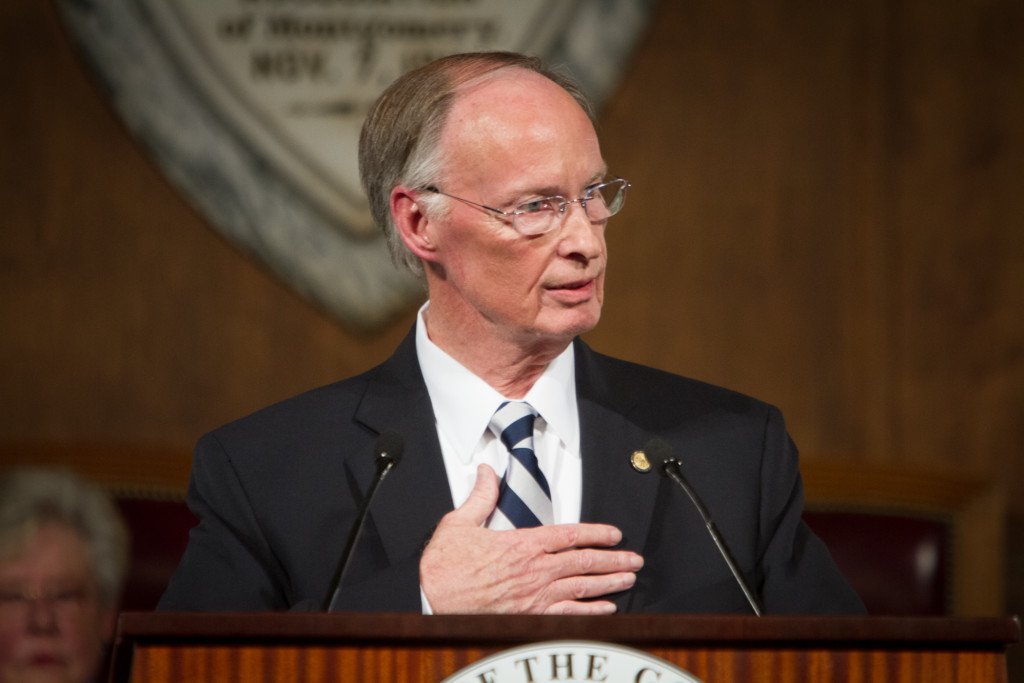
The impeachment process is seldom used in Alabama politics. Reserving its use for only the most egregious of moral or legal transgressions, the power of impeachment is protected from being diluted to a political tool. But with Alabama Gov. Robert Bentley‘s recent admission of impropriety and insistence he will not step down, lawmakers may soon consider using their constitutional tool of impeachment to oust the second-term Republican. How would it go down? The Alabama Constitution lays out the reasons justifying an officer of the state’s impeachment in Section 173: The governor … may be removed from office for willful neglect of duty, corruption in office, incompetency, or intemperance in the use of intoxicating liquors or narcotics to such an extent, in view of the dignity of the office and importance of its duties, as unfits the officer for the discharge of such duties, or for any offense involving moral turpitude while in office, or committed under color thereof, or connected therewith, by the senate sitting as a court of impeachment, under oath or affirmation, on articles or charges preferred by the house of representatives. Most of those calling for the governor’s resignation or impeachment are doing so on the grounds of the section’s “moral turpitude” clause. Although moral turpitude has no distinct legal definition in Alabama, it is generally defined as “conduct that is considered contrary to community standards of justice, honesty or good morals.” Should legislative leadership decide to proceed with the process, a majority of the members of the Alabama House of Representatives would have to approve articles of impeachment. They would be delivered to the lieutenant governor in the Alabama Senate. The impeachment proceedings would take place in the Alabama Senate, to be presided over by the Chief Justice of the Alabama Supreme Court: in this case, Roy Moore. Legislative leadership, however, has yet to comment on whether or not it will consider such action. Who would be governor? Section 127 of the Alabama Constitution clearly lays out a line of succession should the governor be removed from office: Lieutenant Governor Kay Ivey Senate President Pro Tem Del Marsh Speaker of the House Mike Hubbard Attorney General Luther Strange State Auditor Jim Zeigler Secretary of State John Merrill State Treasurer Young Boozer Has it ever happened before? In Alabama’s nearly 200-year history, a governor has never been impeached. Gov. Guy Hunt, the first Republican governor in Alabama since Reconstruction, resigned his office upon being convicted of felonious ethics law violations in 1996, but was not impeached. Where does the legislature go from here? The Alabama Legislature left early for spring break Wednesday, and will resume the second half of the regular session April 5. During the intervening week and a half legislative leadership will likely consider whether or not to pull the trigger on such an unprecedented action. During an already tumultuous legislative session, with Speaker Hubbard facing charges of ethics violations himself, it remains to be seen what long-term consequences of the governor’s actions will be.
Senate passes General Fund budget with $85 million Medicaid shortfall

The Alabama Senate approved a $1.8 billion General Fund budget Wednesday that will provide level-funding to most state agencies, despite a threat from Gov. Robert Bentley that he would veto any budget that did not adequately fund Medicaid. The budget passed by the Senate leaves Alabama’s Medicaid program about $85 million short of the money it had requested. The point of contention for Alabama lawmakers was Bentley’s plan to pull $181 million from education to fund the increase in Medicaid allocations. Senate Pro Tem Del Marsh has said repeatedly throughout the session that there is no appetite among lawmakers to pull from the education budget or to raise taxes any further. The House passed the budget last week and House Speaker Mike Hubbard (R-Auburn) echoed much of Marsh’s sentiments. Hubbard said that the requested increase to Medicaid’s coffers would come at the expense of other state agencies. A failure to provide Medicaid with adequate funding would obliterate the state’s earlier announced plans to institute a Regional Care Operation (RCO) programs. With the RCO plan in jeopardy, many state lawmakers have backed out of their previous promises to see the program come to life. “Alabama took bold steps towards improving healthcare in our state with our plan for regional care organizations and today’s announcement proves our efforts are paying off,” Hubbard said when the plan was announced. “This investment could lead to a more streamlined and localized system, produce better outcomes, and save millions of taxpayer dollars in the long-term.” “The Federal government has determined that Alabama has been innovative with our plan to transition to regional care organizations,” Marsh said at the time. “Over time it will save the taxpayers millions of dollars and will serve as a potential model for states as an alternative to expanding Medicaid.” Despite Bentley’s repeated threats to veto the budget, Alabama Republicans who favor the bill would easily be able to override such a move by the governor.


